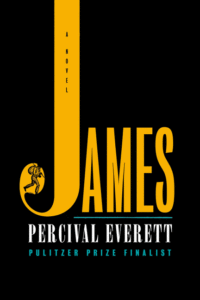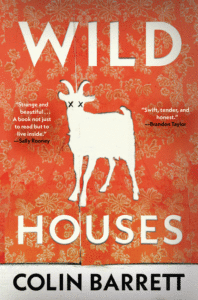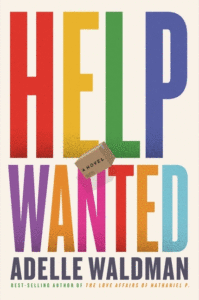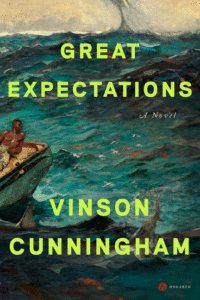
Our murderers’ row of magnificent reviews this week includes Dwight Garner on Percival Everett’s James, James Wood on Marilynne Robinson’s Reading Genesis, Hamilton Cain on Colin Barrett’s Wild Houses, Jess Bergman on Adelle Waldman’s Help Wanted, and Laura Miller on Vinson Cunningham’s Great Expectations.

“Because this is a Percival Everett novel, we are not surprised that he tears down and rebuilds a cultural landmark … Because this is a Percival Everett novel, too, it luxuriates in language. Everett, like Twain, is a master of American argot; he is the code switcher’s code switcher. In James, he puts his skills to incandescent use … What sets James above Everett’s previous novels, as casually and caustically funny as many are, is that here the humanity is turned up—way up. This is Everett’s most thrilling novel, but also his most soulful. Beneath the wordplay, and below the packed dirt floor of Everett’s moral sensibility, James is an intensely imagined human being … He is not scoring easy points. He is evoking and critiquing the American experiment, circa the middle of the 19th century, from a wised-up slave’s point of view. Huck talked a lot about feeling lonesome in Twain’s novel. Everett’s James, at certain moments, seems like the loneliest man who ever lived … My ideal of hell would be to live with a library that contained only reimaginings of famous novels. It’s a wet-brained and dutiful genre, by and large…James is the rarest of exceptions. It should come bundled with Twain’s novel. It is a tangled and subversive homage, a labor of rough love … Everett shoots what is certain to be this book’s legion of readers straight through the heart.”
–Dwight Garner on Percival Everett’s James (The New York Times)
“On the face of it, Robinson should be an ideal reader of Genesis … One wants a novelist of Robinson’s talent to cast her eye over these crooked tales, these stories bent into their shapes by human want and willfulness … At the same time, a novelist who appears to trust in divine intervention the way you or I might trust in a train timetable, who reads these verses as human episodes written by humans who were themselves authored by God, makes for an intriguingly pious commentator … Reading Genesis from inside rather than outside these theological presumptions seems an interesting experiment: it would involve properly crediting both the humanity and the divinity of these strange tales. At her best, Robinson is masterly at this hybrid task … Robinson often makes an eloquent case for the specialness of this new kind of God and the unusual interest, solicitude, and high-handed love he displays to his creations. But perils attend her kind of piety. You soon become aware of Robinson skewing everything in favor of this strange God … But at some point the shadow text extends its ghostly hand, and you realize that Robinson is not merely paraphrasing the text’s sacred premises; she is sermonizing about an actual God and his actual Providence. She is not only speaking of God but for God.”
–James Wood on Marilynne Robinson’s Reading Genesis (The New Yorker)

“Colin Barrett has won widespread, fervent acclaim for two short-story collections. He brings that form’s compression and tensile sentences to his debut novel … Barrett walks a fine line between the rage and despair that drive grifters and misfits … Wild Houses is akin to a Yo-Yo Ma concert at Carnegie Hall: Barrett’s pitch is perfect, the acoustics divine. He metes out his dialogue in syncopated bits, reminiscent of Barry but less slapstick. While a cheeky humor thrums throughout the novel, Barrett isn’t particularly interested in redemption or even plain decency … It’s Hobbes, transported to Ireland’s craggy west. Dev and Nicky, the novel’s moral pillars, can’t halt tragedy’s momentum; they can only deflect it. The author skillfully guides us to a resolution both surprising and inevitable: No one emerges from this dark business unscathed, but some thrive while others slide. Wild Houses unfurls like a controlled detonation, rich with wonder and catharsis.”
–Hamilton Cain on Colin Barrett’s Wild Houses (The Star Tribune)

“As both a novelist and a critic, Waldman has long been frank about her indebtedness to nineteenth-century literature. But after Donald Trump was elected in 2016, something shifted. As she recently put it to Publishers Weekly, she could no longer ‘think like Jane Austen that writing about the romantic and psychological problems of middle-class people was a valid way to spend a career.’ Leaving the lit bro in the rearview, Waldman got a minimum-wage job at a big box store to ‘broaden [her] horizons.’ Whatever else it did for her, the experience appears to have ended a creative drought … Help Wanted is an earnest but dutiful plea to recognize the humanity of the people whose exploitation is the price of our convenience, and an argument for their labor as a subject worthy of serious fiction … If recent contemporary literature is awash in novels about work, most have focused on urban white-collar employees, however unfulfilled and downwardly mobile they may be. Help Wanted is a welcome corrective to that trend … Taken as a whole, the [opening] chapter functions both as a nonchalant rebuttal to the pervasive fiction that this work is ‘unskilled’ and as a window onto the experience of people who are too often taken for granted by shoppers and novels alike. Which is why it’s a shame that a good deal of what follows is so grindingly didactic … In 2014, Waldman published an essay in The New Yorker mounting a defense of the traditional novel form, then perceived to be under threat by the success of autofiction and the increasingly non-narrative shape of contemporary life…It’s difficult not to read the weaknesses of Help Wanted through the lens of this earlier critique. Waldman has by no means renounced ‘the study of individual characters,’ but here they are instrumentalized in service of a larger argument about the cruel way we organize work. Their personalities feel constructed to illuminate their ‘social conditions,’ rather than reflecting them organically.”
–Jess Bergman on Adelle Waldman’s Help Wanted (The New Republic)

“David is the quintessential Jamesian narrator, a highly cultured person committed more to observation than to participation … A novel of this kind lives or dies by the exactness of its observations and the grace with which they’re expressed. Cunningham rarely falters in either, even if he occasionally goes overboard cataloging everyone’s clothing and how well it fits … The lovely aptness of Cunningham’s metaphors makes the loops and whorls of David’s search for a fitting sense of himself a pleasure to follow. His prose rests like a cool hand on a fevered forehead. An inveterate ruminator, David tries to reconcile his ambivalent religious yearning—he was raised as a Pentecostal, then went through a brief Richard Dawkins phase before returning to a hobbled faith with his daughter’s birth. He’s not so much God-bothered as church-bothered; he wants to belong somewhere again … It isn’t hard to figure out how David will form a center for his transfigured self. Huge swaths of his life—the stuff that most people consider central to their own identities—can barely be glimpsed in Great Expectations. But that doesn’t make the spectacle of this pilgrim’s progress any less captivating.”
–Laura Miller on Vinson Cunningham’s Great Expectations (Slate)

